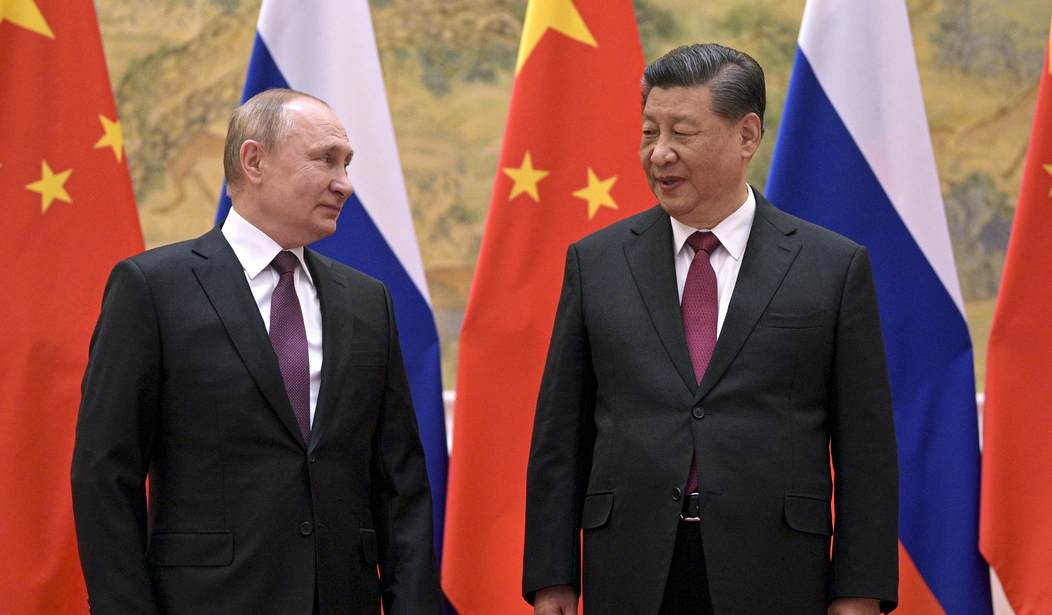Call this one the Mother Of All Signals, if true. China’s financial entities have cut off credit for Russian energy sales, Bloomberg reports, following an avalanche of Western sanctions over Vladimir Putin’s invasion of Ukraine:
Singapore’s biggest banks are restricting trade financing for Russian raw materials, as the war in Ukraine spurs lenders in Asia’s largest energy and commodities trading hub to reduce exposure to the sanction-hit country. …
DBS Group Holdings Ltd., Oversea-Chinese Banking Corp. and United Overseas Bank Ltd. have stopped issuing letters of credit involving Russian energy deals because of uncertainty over the course of sanctions, according to the people, who asked not to be identified as the information isn’t public.
A choke on trade financing in a top commodities hub such as Singapore could snarl the trade of some physical cargoes and add further pressure to prices, even though the U.S. and European Union sought to exclude energy from the latest round of new sanctions.
It’s not just Singapore, but China itself. Singapore is apparently responding to that signal:
Lenders in the city-state, a key trading hub for commodities trade and finance in Asia, join at least two of China’s largest state-owned banks and some banks in Europe in restricting the ability to purchase Russian commodities.
Reuters reports more directly on the Bank of China’s actions, via The Straits Times:
Bank of China’s Singapore operation has stopped financing deals involving Russian oil and Russian companies, amid concerns of western sanctions following Russia’s invasion of Ukraine, said a source on Monday (Feb 28) with knowledge of the matter.
Bank of China did not immediately reply to requests for comment. …
At least two of China’s largest state-owned banks are restricting financing for purchases of Russian commodities, underscoring the limits of Beijing’s pledge to maintain economic ties with one of its most important strategic partners in the face of Western sanctions.
That seems fairly inconsistent with this message from Beijing’s official diplomatic corps:
Sanctions will not only cause a lose-lose or all-lose situation in economy, but also disrupt or impact on the political settlement process.
— 刘晓明Liu Xiaoming (@AmbLiuXiaoMing) February 28, 2022
Sanctions are designed to “create new problems,” mainly for the target of such sanctions. Lest we forget, Putin and Russia created a lot of “new problems,” not to mention gross violations of international law and untold deaths of Ukrainians, by launching an unprovoked war. The West tried diplomacy and “the political settlement process,” only to be ignored by Putin and by Beijing despite multiple entreaties for their intervention.
And with his economy in free-fall, this is one outcome that Putin cannot afford. The ruble is now damn near worthless in the short term, and his access to hard currencies has been severely limited if not entirely eclipsed. The only reliable and substantial income Russia still has comes from sales of oil and natural gas, but they need lines of credit to move those commodities more than ever. They don’t have enough cash up front, and they’re presently contracting their monetary supply with high interest rates to check inflation.
These relatively quiet measures by China speak to a dawning realism in Beijing. Perhaps they shared Putin’s delusion that the West was too fractured to respond effectively to provocations. Or perhaps even China got blindsided by Putin’s military aggression and are now wondering whether they signed onto the Soviet end of the Molotov-Ribbentrop Pact over the last few weeks. For a country that’s decrying sanctions, this new report makes it look like China’s at least complying with enough of them to send a warning shot across Putin’s bow.
At the very least, China’s now seeing some value in playing both sides of the street, which is a signal in itself. If China’s yanking back on credit for Russian oil sales for the long haul, Putin’s in a severe, existential crisis. He has nowhere else to go if China cuts him off, and no way to bully China back into a firm alliance.
Update: I forgot to hat-tip Twitter reader Kelly Eells for this development. My apologies.








Join the conversation as a VIP Member